Getting Your Keywords Right
A Guide With Examples
When you publish at Amazon KDP or elsewhere they ask you to provide keywords. So, do you simply type in what you think people will enter? A five-minute task? If that's what you settle for, then you are setting yourself up for failure.

Are keywords optional?
According to Amazon KDP keywords are 'optional' and 'help readers find your book when they browse the Amazon site'. My advice is that keywords are not optional, in fact they are essential.

The term ‘keywords’, or tags as other retailers call them, should really be ‘key-phrases’ because they can be up to 50 characters long. The total length of keywords at Amazon appears to be 400 characters. Prepositions (for, with, from, over, through), articles (a, an, the) and conjunctions (and, or) are optional in the keywords.
You would be foolish to consider keywords as optional. Keywords are essential because they help readers find your book. Specifically, they help readers find your book cover and title. According to Dave Chesson of Kindlepeneur, "66% of all book shoppers on Amazon use Amazon’s search bar to find a book. But more importantly, 89% of all those searches end in a purchase. This means that if you can get your book in front of those shoppers, you’ll make more sales."
Keywords choice
Amazon ask you to use no more than seven generic keywords that describe sub-genre, mood, and location. They advise authors to consider using the following types of keywords:
- Setting (e.g. Colonial Africa)
- Character types (e.g. single mum, divorcee)
- Character roles (e.g. powerful witch)
- Plot themes (e.g. coming of age, revenge)
- Story tone (e.g. dystopian, conspiracy)
Use phrases you think people would use to find your book content as a starting point. There are some words Amazon say you should not use in keywords:
- Information covered elsewhere in your book's metadata (title, contributors, etc.)
- Subjective claims about quality (e.g. ‘best novel ever’)
- Time-sensitive statements (‘new’, ‘on sale’, ‘available now’ and ‘FREE’ – Amazon assumes that such a book will not always be free)
- Information common to most items in the category ("book")
- Deliberate spelling errors. (‘sycology’)
- Variants of spacing, punctuation, capitalization, and pluralization (‘80GB’ and ‘80 GB’, ‘computer’ and ‘computers’, etc.). Exception: Words translated in more than one way (e.g. ‘Mao Zedong’ or ‘Mao Tse-tung’, ‘Hanukkah’ or ‘Chanukah
- Anything misrepresentative like the name of an author not associated with your book. Kindle Direct Publishing has a zero-tolerance policy for metadata that is meant to advertise, promote, or mislead
- Quotation marks in search terms. Single words work better than phrases, and specific words work better than general ones. If you enter “complex suspenseful whodunit”, only people who type all of those words in that order will find your book. For better results, enter this: complex suspenseful whodunit. Customers can search for any of those words and find your book
- Amazon program names such as ‘Kindle Unlimited’ or ‘KDP Select’
People won’t look for words that relate only to your book unless they already know about it. Don’t over use the keywords because this can look like “keyword stuffing,” a spammy practice that can get you dropped in ranks.
At Amazon, find out if your selected book genres have keyword requirements and make sure you use those keywords. You’ll find these at http://bit.ly/keywdcat
Don’t use your book title as a keyword. That would waste the slot since Amazon already searches titles and subtitles. If you would like to have more than seven keywords an easy way of using extra keywords is to use them in subtitles and book descriptions.
Enter your key phrases in a manner that readers would search for. For example, readers are more likely to search for ‘paranormal romance’ than ‘romance paranormal’. If you use them in the wrong order your book may still be found but it will have a lower rank in the search results.
Before you enter one of Amazon's seven keywords, check the keyword by doing a search for it at an Amazon page. You'll get an idea of how popular it is as you enter it because it predicts terms based on what other people have typed.
You can read Amazon's keyword guide at https://kdp.amazon.com/en_US/help/topic/G201298500
Let’s look at two examples of finding keywords.
Example 1 - Raging Storm by Shelia Chapman
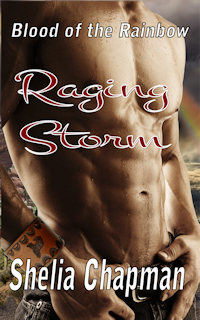 Back in 2013 when I first published my wife's book 'Raging Storm' I used the 'five minute task' method. Although it got fantastic five star reviews, its sales were slow. Downloads for this series starter book were not exactly stellar. I decided to return to this book and see what I could do to increase sales by working with its keywords. The keywords I had chosen in 2013 were:
Back in 2013 when I first published my wife's book 'Raging Storm' I used the 'five minute task' method. Although it got fantastic five star reviews, its sales were slow. Downloads for this series starter book were not exactly stellar. I decided to return to this book and see what I could do to increase sales by working with its keywords. The keywords I had chosen in 2013 were:
- Paranormal romance.
- A Vested Interest - chosen because this book has a following series of this title.
- Romance - Not a good choice since it is a huge Amazon genre.
- Telepathy – The book features mind reading.
- Native American – A protagonist was a member of a ‘Navajo’ clan.
- Mind-reading
- Romantic suspense
When I looked at these keywords again, I thought first of the genre or theme of the book. I chose Amazon’s genre Fiction >Romance > Paranormal. Amazon tell you not to type in the genre but to type in words in the order people expect. So, I didn’t enter ‘Romance Paranormal’ and instead chose 'Paranormal romance' as my keyword. Here's what happens when I type the first letter in an incognito browser Amazon search window. I use ‘incognito’ because I don’t want the results to be influenced by previous searches I’ve done.
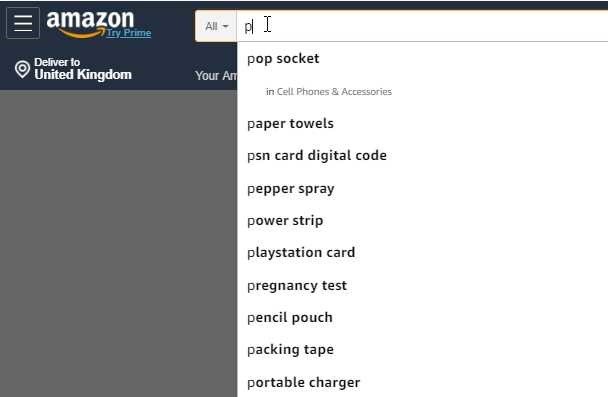
You'll notice as soon as you start typing, Amazon starts making suggestions based on what other people are looking for. Nothing useful so far (I’m curious about the ‘Pepper spray’ though.) I continued typing.
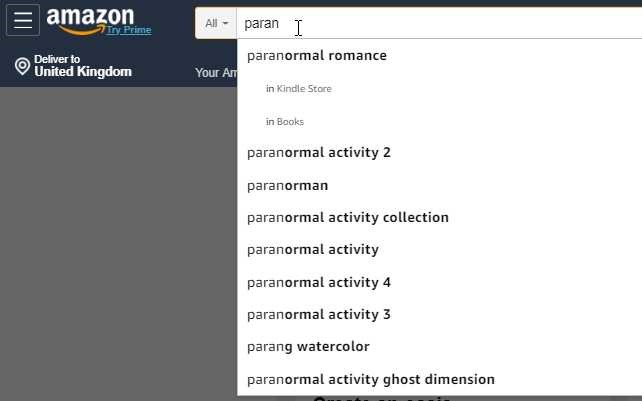
By the time I'd entered five letters I started to get results.
It found ‘paranormal romance’ and ‘paranormal activity’ with ‘paranormal romance’ showing in Kindle and books. That indicates my keyword wasn’t a bad choice and was popular.
You can use the same method to get suggestions from a Google Search. Again, I suggest you do this in an incognito browser window to avoid previous searches influencing the results.
Doing the same with my original keyword choices I got:
A Vested Interest – finally found after typing in ‘A Vested I’. This isn’t a good keyword since few people will use it unless they are looking for another of the books in that series.
Romance – ‘rom’ found ‘romance books’; ‘roma’ found ‘free romance kindle books’(Free and Kindle are forbidden keywords); ‘romanc’ found ‘romance novels’.
Telepathy – ‘telepa’ found ‘telepathy books’, ‘telepathy’ and ‘telepath hive mind’
Native American – ‘native a’ found ‘native American’ and ‘native American books’. Experimenting I also found ‘native American fiction’
Mind-reading – ‘mind-read’ found ‘mind-reading’ and continuing to type I found ‘mind-reading sci-fi’
Romantic suspense – ‘romant’ found ‘romantic suspense kindle books’
That gave me some ‘starter’ keywords to work with:
- Paranormal romance
- Paranormal fiction
- Romance books
- Romance novels
- Telepathy fiction
- Native American fiction
- Mind-reading science fiction
Since the words in keywords are better not repeated and ‘books’ is a keyword to avoid since so many people search for it, these became:
- Paranormal romance
- Romantic stories
- Romance novels
- Telepathy fiction
- Native American ebooks
- Mind-reading sci-fi
That’s only six keywords so I followed Amazon’s advice and added the locations the book was set in and its theme:
- Louisiana and Arizona coming of age
Next, I use two keyword research tools which are free to use online. One searches for Amazon keywords, the other searches for Google keywords. Both sets of results can be used but there’s a big difference how these Internet behemoths do a search. Google uses an intelligent search which tries to interpret the meaning of what you are looking for. If you enter ‘great paranormal romance’ it will look for popular paranormal romance also. Amazon’s search is just plain dumb. What words you enter must appear in the search results.
If you find this guide useful...
Can you help me out?
If you find these pages useful you can return the favour by downloading a FREE ebook from Amazon - even if you don't read it, it will help our rankings! I think you'll probably like it though.
It's the first book of a series of 9 books (so far) which tell the story of how life on Earth was saved from a cataclysmic extinction when a rogue planetoid collides with Earth in 7141. This first book deals with how humanity was made immortal, giving us the incentive to do something about an event so far in the future.
Take a touch of humour, add some genetic science and nanotechnology. Steep with conspiracy and stir in murder and despair. Season with romance between three people in a secret location. Garnish with morality.
The result is 'Immortality Gene', the first in a novel series by John and Shelia Chapman. The ebook of book 1 is FREE and available at multiple retailers
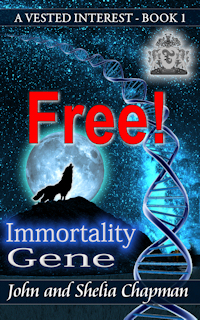
Get it from your favourite store
Don't just take my word for the keyword advice shown on this page.
Dave ChessonOne of the people I consider to be an expert at self-publishing. of Kindlepreneur has written a similar page which you should check out also. It's at https://kindlepreneur.com/how-to-choose-kindle-keywords/
Using an AI
Once you've decided on your keywords do a final check. Run your keyword choice through an AI. In my case I used Google Gemini. You can read the conversation here.
Step by step guide to finding better keywords
Here's the process I use to update the keywords. I start by using AI. In this case I was looking for keywords for my time travel short stories. I've hilighted the keywordsI selected from the artificial intelligence choices.
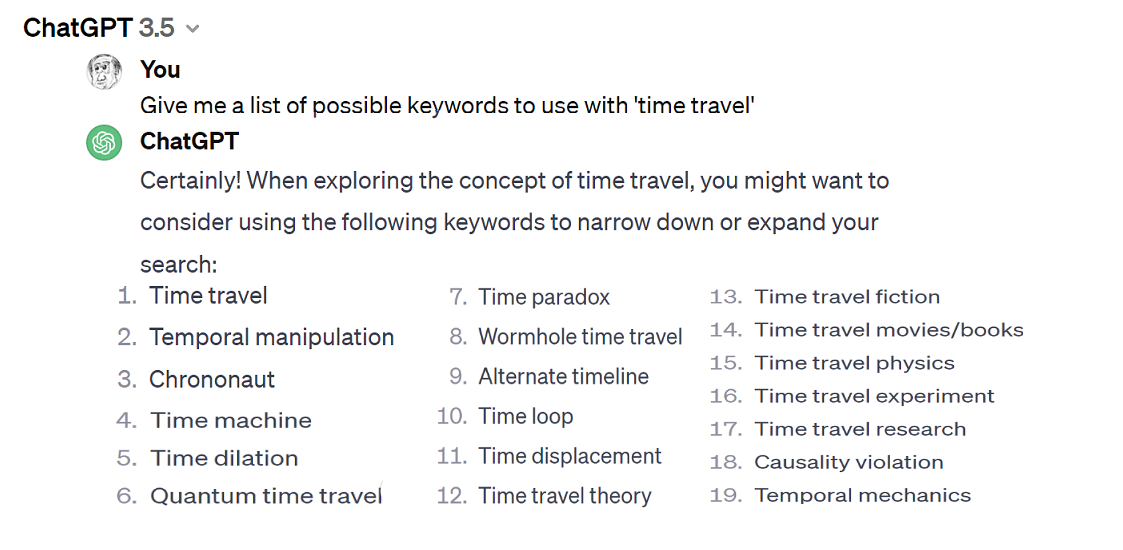

That gives me 21 keywords for a time travel book.
Or maybe a free online interactive adventure story?
Back in 1982 early text only adventure games were being written for home computers. One such game was 'Castle of Riddles' written by Peter Killworth and published by Acornsoft. Now it's been re-written and greatly expanded with added images and sound. Play it on your computer, tablet or even a phone.
Check it out at https://jaydax.co.uk/corr
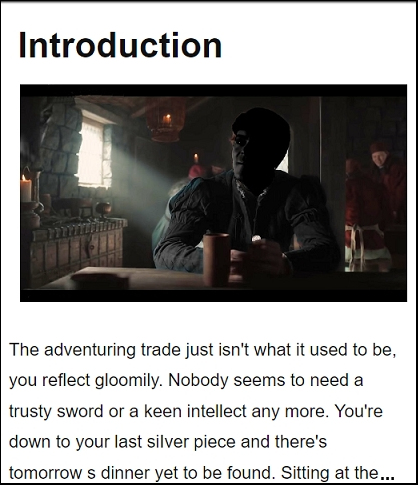
Going back to my wife's paranormal romance book:
Step 2 – I used the Scientific Seller keyword tool at http://app.scientificseller.com/keywordtool and entered my keywords one per line. There is good news and bad news though. The bad news is that the site seems to have stopped functioning in July 2023. The good news is that it's still available and working at the Internet Archive. Using the keyword tool is free. You’ll find it best to do the search during the night. Leave your computer logged on at the page overnight.
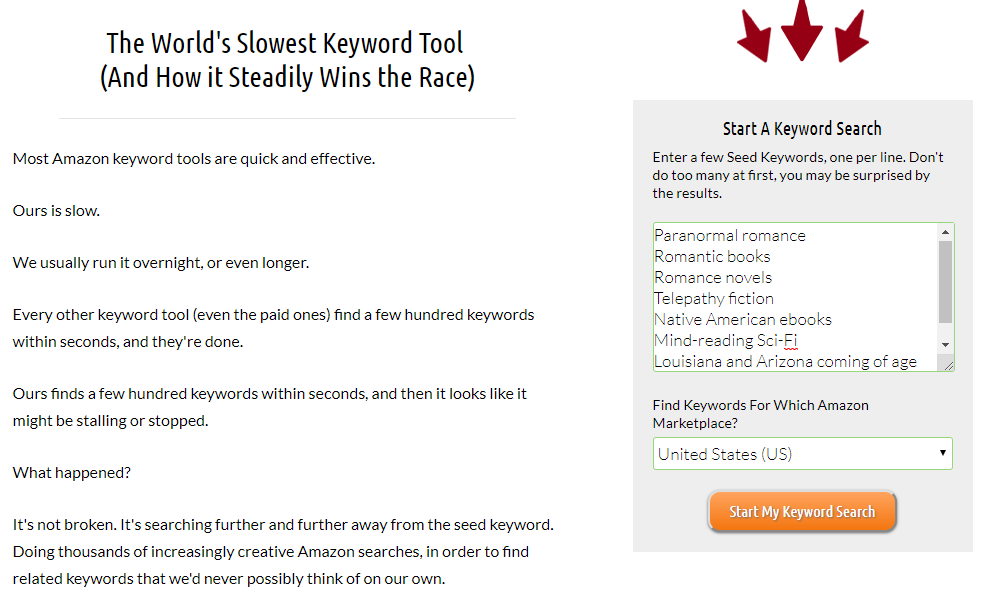
Once you click to start the keyword search you wait – it warns you it will be slow.
Scientific Seller will find lots of keywords for your books but it will also find what it calls ‘stuff’ words. Those stuff words can make a huge difference to how readers find your books. Let me explain further. Look at these two keyword searches and notice how many items are found.


As you can see adding the word ‘great’ has a dramatic effect on the number of items found. It changes that 50,000+ to 129. The word ‘great’ is a stuff word. Which group do you think you have a better chance of selling to; the 50,000+ group or the 129? You normally shouldn’t use these words in your keywords but do use them in your titles, subtitles and book description. According to Scientific Seller, Amazon makes little use of the product description when it searches for keywords. However Scientific Seller is designed for non-book retailers. Such products offer a bulleted list of product features which are searched for keywords. Books don’t offer this bulleted list (although you can add one if you know HTML) The descriptions for books are searched for keywords and are a good place to include ‘stuff’ words. Google searches book descriptions too so you should use the ‘stuff’ words there.
Step 3 Use the Moz Keyword Explorer tool. This allows you to enter one of your keywords and it will quickly find up to 1,000 related keywords. Not only that but it will give you an idea of how popular these keyword suggestions are.
Step 4 – Look at the reviews and descriptions of books with a similar theme. See if you can pick out any keywords from these. If your book already has reviews, then go through those too. I picked out:
- unique people, extraordinary situation
- beautiful but sad story
- force of destiny and fate
- endless romance
- laugh, smile, cry and love
- love at first sight
- mystery, love, jealousy, and sadness
- combining romance and paranormal
- adventure, suspense, and romance
That gives me 19 keywords; a lot more than Amazon’s allowance of seven but that’s not a problem.
The Internet Archive
Did you know about this? The Internet is a wonderful place but websites there are not eternal. Many times you will go to a bookmarked website and find something like:
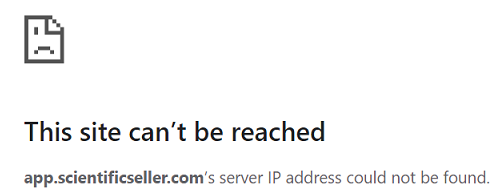
In such cases I try looking up the URL I have for the page at the Internet Archive
This is a free public organization which has made its business to create an archive of web pages since 1996. If you find a useful web page and are concerned the page might die at some time, then make sure it is added to the Internet archive.
The Internet Archive is a non-profit organization and is a worthy cause to support with periodic donations.
Want a short story instead?
I've written a number of short time travel stories. Each is 99p/99¢ and great for taking a break from writing.
Check them out at http://iwadasn.info
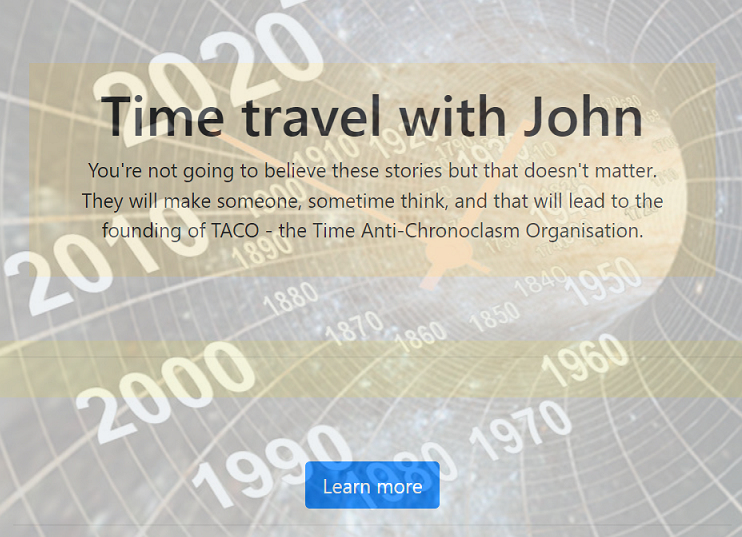
Alternatively you can get all four stories in a collection at https://books2read.com/tat they deal with 'Jack the Ripper', 'The Blair witch', why the Titanic
My wife Shelia is an author, I co-wrote the A Vested Interest series of books with her. She wrote a prequel series of three books to it - the 'Blood of the Rainbow' series. This series is decidedly 'paranormal romance.'
The first book of this series has a remarkably powerful ending which generated eleven glowing 5 star reviews. 'Great' you might think but that turned out to not be the case. Readers were put off by those reviews since they simply couldn't believe them. I actually had to ask people on social media to be more critical and NOT give it a five star review!
A few less positive reviews complaining about the wimpy protagonist did the trick and sales surged.
Good news! The book is now permamently FREE.
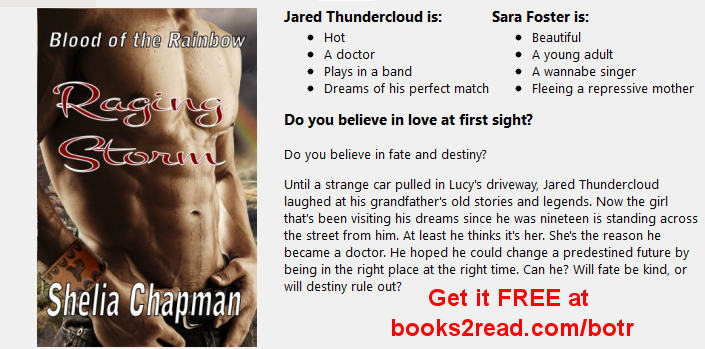
Download it via https://books2read.com/botr
Example 2 - Choosing Keywords for a non-fiction book
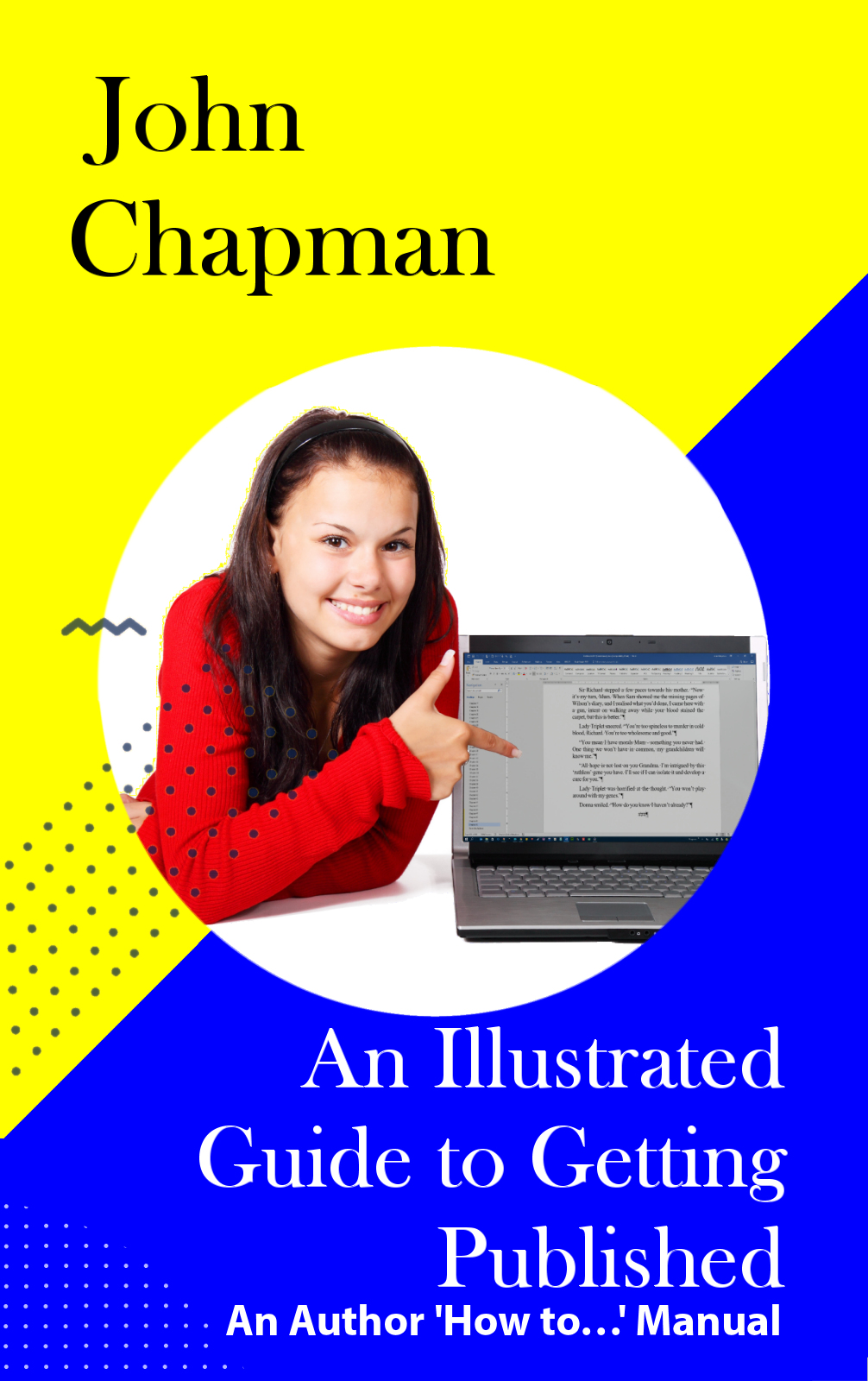 For my old book 'An Illustrated Guide to Getting Published' I thought of ‘publishing guide’ but ‘guide’ is already in the title, so I looked for alternatives. ‘Manual’ is in the subtitle. Keeping it simple the keyword became ‘publishing a book’. Next, I chose ‘making an ebook’, ‘editing and formatting’, ‘creating a print-on-demand non-fiction or novel’ …and there I got stuck. On to the next step.
For my old book 'An Illustrated Guide to Getting Published' I thought of ‘publishing guide’ but ‘guide’ is already in the title, so I looked for alternatives. ‘Manual’ is in the subtitle. Keeping it simple the keyword became ‘publishing a book’. Next, I chose ‘making an ebook’, ‘editing and formatting’, ‘creating a print-on-demand non-fiction or novel’ …and there I got stuck. On to the next step.
I used an incognito browser window to search Amazon for the top ebooks found by my first keyword. I used an incognito browser so that previous searches didn’t influence my results. I made a record of the book ASIN (Amazon Standard Identification Number), the overall book rank and the genres and rank in those genres. I also noted the ebook price. This is probably easier to do for non-fiction books like this one but can still be done for fiction. Here’s the top four I found in August 2017.
Book ASIN/Price
|
Overall rank
|
Genre rank & genre
|
B019H38JL2
(Successful Self-Publishing by Joanna Penn)
Free
|
#1,526
|
#1 in Reference > Writing, Research &
Publishing Guides > Fiction
#1 in Reference > Writing, Research &
Publishing Guides > Nonfiction
#1 in Business & Money > Skills >
Business Writing
|
B01AZIGEQA
(Self-Publishing Success by Christine John)
$1.29
|
#12,067
|
#8 in Computers & Technology > Graphic
Design
#13 in Business & Money > Skills >
Business Writing
#25 in Kindle Short Reads (22-32 pages) >
Computers & Technology
|
B071LP174V
(Book Launch Formula by Justin Ledford)
$3.88
|
#24,239
|
#5 in Crafts, Hobbies & Home > Crafts
& Hobbies > Reference
#9 in Business & Money > Skills >
Business Writing
#15 in Reference > Writing, Research &
Publishing Guides > Publishing & Books > Authorship
|
B01M0J5KZA
(How to Publish a Book by Sam Kerns)
$2.99
|
#37,535
|
#7 in Business & Money > Marketing &
Sales > Advertising > Writing Skills
#8 in Reference > Writing, Research &
Publishing Guides > Nonfiction
#20 in Business & Money > Skills >
Business Writing
|
Looking at the book descriptions of each I picked out the following additional keywords (key phrases):
- self-publishing success
- Write, edit, publish and promote
- become a best-selling author
- step-by-step approach to publication
- promote your ebook
- market my book
- making book covers
- effective book descriptions
- selecting book keywords
- choosing a genre
- sell my book
- create best-selling books on Amazon

I added ‘publishing for profit’ and ‘publishing 101’ to my list of keywords. Continuing to type, I got ‘publishing a book at amazon’ and ‘publishing a book for dummies’ before I eventually got to ‘publishing a book’. Testing the other keywords in the same way I ended up with this list as the best choices:
- publishing an ebook
- editing a novel
- self-publishing 101
- become a best-selling author
- promote your book
- marketing books
- book cover design
- beginners guide to publishing
I also picked out a number of other useful keywords which I could use in the meta tags of an EPUB ebook. I used the Scientific Seller and Google keyword tool also.
Other methods of selecting keywords
1. Steal them A good way to learn about keywords is to find some examples of their use in successful ebooks. The problem is they are not listed on book pages at Amazon. One method is to get them using the calibre ebook management program. Unfortunately, this method only works for books which were submitted to Amazon as EPUB files. EPUB files are currently Amazon KDP's favoured source format.
- In calibre, create a blank e-book - that's the add book dropdown > empty book. Create. Don't add any details.
- Find your genre in Amazon and look for the bestsellers in it. If you can, pick out a book with a similar style to your own. Go to its product section and copy the entire line starting ASIN...
- In calibre go to your empty book and choose Edit metadata. In the section IDs paste in the ASIN line you copied at Amazon then click 'Download Metadata'.
You'll get the keywords (Tags) and description of a successful book which you can examine and adapt. I suggest you do this with several successful books to see what they have in common. You can delete these dummy e-books once you've examined them.
Pay attention to how the keywords appear in the description and in the preview of the book you can download at Amazon. You might notice some use more than the seven keywords allowed by Amazon. That’s because EPUB files can contain more than seven keywords embedded in their meta data.
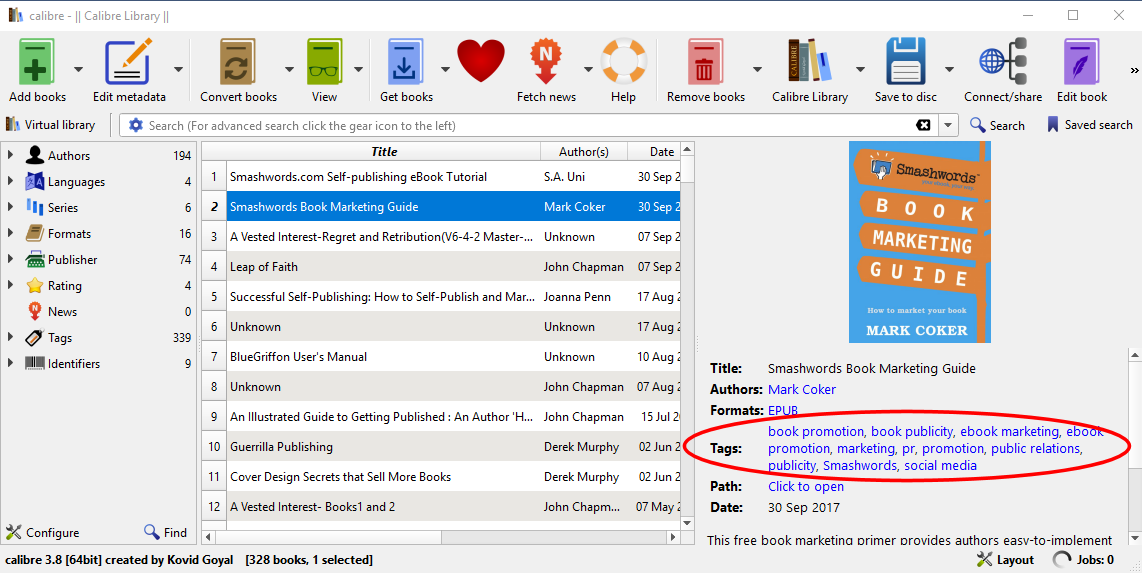
2 Use Publisher Rocket This is a program for authors produced for Kindlepreneur. A new addition to it is a reverse ASIN lookup tool. Like the calibre metadata lookup it doesn't always find the book's keywords and it won't retrieve book descriptions (which you can see when you look up the ASIN anyway) but it's quicker to use and there are other features of the program such as Keyword Search, Competition Analyzer, Category Search, Amazon Ads which make it a worthwhile purchase.
3. Get them from Smashwords If the book is available there, you can see the keywords used on the book’s page there. You can also download a sample EPUB file and import that into calibre. The keywords (tags) will be displayed when the book is selected in calibre.
Next step: Produce a book description.
As an Amazon Associate, I earn from qualifying purchases.
Times change and my book 'An Illustrated Guide to getting published' shown here is now out of date, especially where it mentions 'Create Space' for print-on-demand publishing and Twitter apps which no longer work.
A lot of its hints are still valid though so I've made it a 'reader-sets-price' ebook at Smashwords. Feel free to pay 'nothing' for it. It's $0.99 elsewhere. Get the Smashwords version:
If you like to read on a Kindle or using the Kindle app then send the epub version to your Kindle email address. Amazon will convert this to a version your Kindle/app can display.
If you don't know how to do this then follow these instructions:
- Download the epub file to your computer at Smashwords
- Go to an Amazon web page and log on
- From the dropdown 'Hello [your name] Account & lists' select 'Manage your content and devices'
- From the 'Preferences' tab select 'Personal Document Settings' to expand it.
- You'll get a list of the email addresses of your devices. Make a note of the one you want to use.
- Scroll down until you get to 'Approved Personal Document E-mail List' and make sure the email address you normally use is present. Use 'Add a new approved e-mail address' if needed.
- Use your normal email program and send the epub file you downloaded from Smashwords as an attachment to the email address of your Kindle/App. Amazon will take a minute or so to make it available on your device.
There's an entire 'for dummies' series of books available. Personally I find the title puts me off since I don't consider myself a dummy. I have looked at several of them though and find the style puts me off too! Lots of people do seem to like them so ''[subject] for dummies' might be a useful keyword. You might find a better choice might be 'Beginner's guide to [subject]' - what the heck - use both.